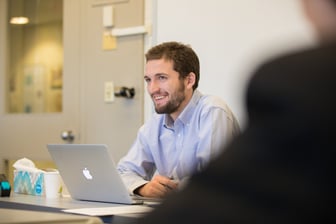 How do Tabor students see the world around them? In the past three years, the curriculum of the Introduction to Microeconomics and Macroeconomics courses have adjusted to incorporate data analysis, statistics, and predictive modeling to inform the worldview of students. In a world of economic opinions and theories, which often are polarizing, data is the unbiased way to sift through opinions and assumptions to reach a further understanding. The major goal in economic electives at Tabor is to take the often dry study of traditional economics and create a class with life, intrigue, and nuance.
How do Tabor students see the world around them? In the past three years, the curriculum of the Introduction to Microeconomics and Macroeconomics courses have adjusted to incorporate data analysis, statistics, and predictive modeling to inform the worldview of students. In a world of economic opinions and theories, which often are polarizing, data is the unbiased way to sift through opinions and assumptions to reach a further understanding. The major goal in economic electives at Tabor is to take the often dry study of traditional economics and create a class with life, intrigue, and nuance.
Gabe Gamer, a senior at Tabor, states, “So far I have taken Macro, and am currently taking Micro. Economics classes with Mr. Britton offer me a way to conceptualize a lot of everyday occurrences in a new light and perspective.” Economics has typically been taught through theory and algebra, but with new access to open source data, the study of economics can now incorporate the modes of both algebra and statistics.
In Microeconomics and Macroeconomics, we teach economics through theory and statistics. It is much like teaching history through primary and secondary sources. The way one forms economic conclusions should follow a similar path. A student can theorize all they want, but if they do not have real-world data to back up a hypothesis, it is hard to form a concrete conclusion. On the other hand, without a theoretical framework, it is hard to understand the data and results from student testing and computer modeling. Theory and statistics are reliant on each other.
In Macroeconomics, our major assignment requires students to download, test, and research data from the Federal Reserve database. Students learn how to use spreadsheet programming, simple computer logic, and intermediate statistics to solve problems that were unavailable and unsolvable for high schoolers ten years ago. Students analyze and test variables ranging from median gross domestic product per capita to crude oil price. Jake Peluso ’20 mentioned, “The vocabulary has given me a base for understanding the news. I now have the confidence and knowledge to take higher level economics classes, and it sparked an interest in business, economics, and finance.” The goal of our final project in Macroeconomics is to test whether the standard economic theory holds in real life scenarios. In many cases, we see high correlation coefficients that support our hypothesis and in other cases, we do not see our textbook’s theories represented in the data. Many accepted economic theories are not necessarily revealed with simple data analysis.
In Microeconomics, we hypothesize on human decision making and use statistics to test the outcomes. As a class, we focus on topics ranging from supply and demand to the optimal way to play card games. From there we can create models and find datasets that attempt to simulate how these systems work. We will work on building stock-trading algorithms, but also study the implications of redlining policies in American cities. Microeconomics students get to explore subjects that interest them and which have very direct and immediate impacts on our lives. The class is structured differently than Macroeconomics. Margaret Adams ’19, states that “Micro so far has been more interesting and a bit easier to grasp, simply because we are talking about real-world stuff. We talk about things that are enticing to the class like basketball statistics or specific companies and firms we actually know of or have heard of, while Macro focused on the bigger picture.”
The skills learned in economics allow students to practice critical thinking, in-demand computer skills, and applied math. These skills can benefit students in many fields of study such as biochemistry, medicine, economics, finance, psychology, and astrology. Testing data and forming a hypothesis is critical. The goal is to graduate students who can employ skill sets that are applicable to college and job-readiness, while also developing their passion for economic analysis.
"Mr. Britton teaches economics by including skills that we will use in college and outside of the classroom long after I forget who John Maynard Keynes was." - Nick Gebhardt '20








